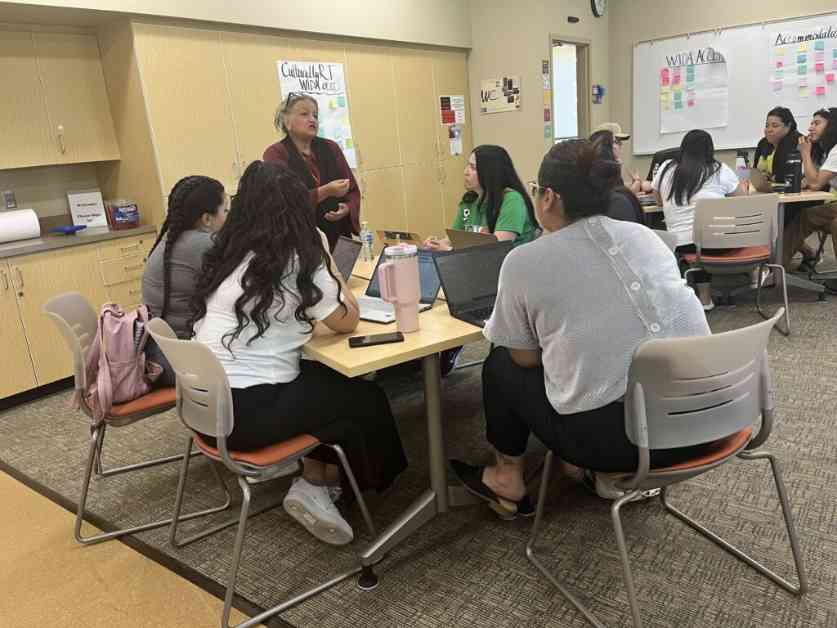Washington State Sets Example in Community College Bachelor’s Degrees
In the heart of Washington state, community colleges are paving the way for students seeking bachelor’s degrees in fields like education and nursing. While California is taking steps towards a similar initiative, Washington’s approach offers a successful model for providing higher education opportunities to students in rural areas.
The Path to Success in Washington
Washington state allows community colleges in rural areas to offer bachelor’s degrees in various programs, provided there is a demonstrated regional workforce need and student interest. This approach ensures that place-bound students, who are limited in their ability to attend college far from home due to work or family commitments, have access to higher education.
According to Constance Carroll, president of the California Community College Baccalaureate Association, students in isolated communities should not be deprived of the opportunity to pursue higher education. Washington’s community colleges have been offering bachelor’s degrees since 2005, with 33 colleges currently providing a total of 165 bachelor’s degrees, including programs in nursing and teacher education.
Unlike California, where community colleges are restricted from offering degrees that duplicate those available at four-year universities, Washington considers additional factors such as location when approving new bachelor’s degree programs. This approach allows colleges like Yakima Valley College to cater to the specific needs of their region’s workforce and student population.
The Impact of Community College Bachelor’s Degrees
Saray Preciado, a resident of Yakima, Washington, decided to pursue a bachelor’s degree in education at Yakima Valley College after being laid off from her paralegal job during the Covid-19 pandemic. With a young daughter and a husband working full-time, the convenience of attending evening classes at the local community college made it the ideal choice for Preciado.
Similarly, Sofia Gonzalez found the dental hygiene bachelor’s degree program at Yakima Valley College to be a perfect fit for her family-oriented lifestyle. Living at home with her mother and younger brother, Gonzalez appreciated the affordability and accessibility of the program, which allowed her to pursue her career goals while supporting her family.
Pedro Huecias, a graduate of Yakima Valley College’s agricultural sciences program, used his bachelor’s degree to develop a plan for owning and operating his own vineyard. With the practical experience gained through the program, Huecias hopes to turn his dream into a reality and contribute to the local agricultural industry.
Challenges in California
While Washington’s community colleges have been successful in offering bachelor’s degrees tailored to regional needs, California faces challenges in expanding its community college degree programs. The state currently allows 42 bachelor’s degree programs across 35 community colleges, with more proposed programs awaiting approval.
However, duplication concerns raised by the California State University (CSU) system have stalled the approval of eight proposed degrees, including those in critical areas like education. Francisco Rodriguez, chancellor of the Los Angeles Community College District, highlights the potential of community colleges to address workforce shortages in fields like education, particularly in rural counties facing teacher shortages.
A recent report by the UCLA Center for the Transformation of Schools identifies nine rural counties in California as teacher education deserts, underscoring the need for expanded higher education options in these regions. Allowing community colleges to offer credentialing programs for students with bachelor’s degrees and bachelor’s degrees in education could help alleviate the teacher shortage and improve educational outcomes in underserved communities.
Legislation and Future Prospects
Senate Bill 895, currently under consideration in California, aims to permit up to 15 community colleges to offer bachelor’s degrees in nursing to address critical shortages in the healthcare workforce. The bill, if passed, could set a precedent for allowing community colleges to offer degrees currently provided by CSU, with priority given to colleges in underserved areas.
Despite opposition from CSU and the Association for Independent California Colleges and Universities (AICCU), supporters of the legislation believe it is essential to address workforce shortages and provide opportunities for students in underserved regions. The bill’s passage could signal a shift towards a more flexible approach to community college bachelor’s degrees in California.
Looking Ahead
As the debate over community college bachelor’s degrees continues in California, Washington state serves as a model of success in providing higher education opportunities to place-bound students. By tailoring degree programs to regional workforce needs and student interests, community colleges in Washington have demonstrated the value of offering bachelor’s degrees in fields like education and nursing.
With ongoing legislative efforts and advocacy for expanded community college degree programs, California has the potential to follow in Washington’s footsteps and offer a wider range of bachelor’s degrees to meet the diverse needs of its student population. By prioritizing regional labor market needs and supporting innovative degree programs, community colleges can play a vital role in addressing workforce shortages and improving educational outcomes across the state.
